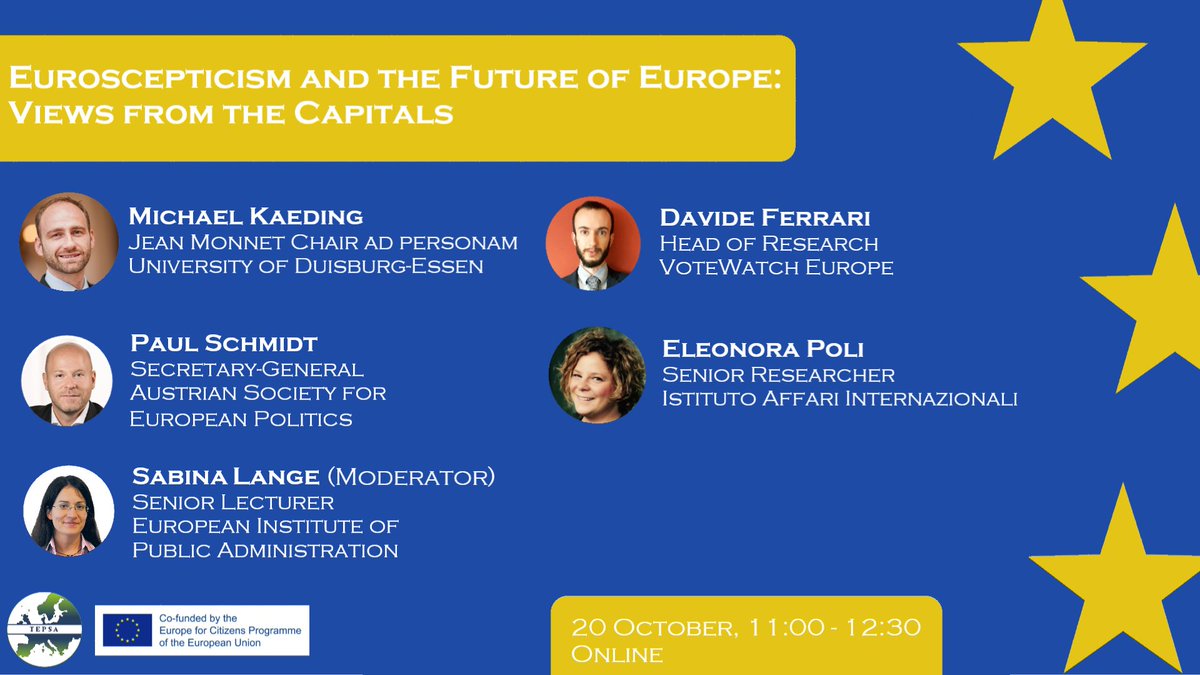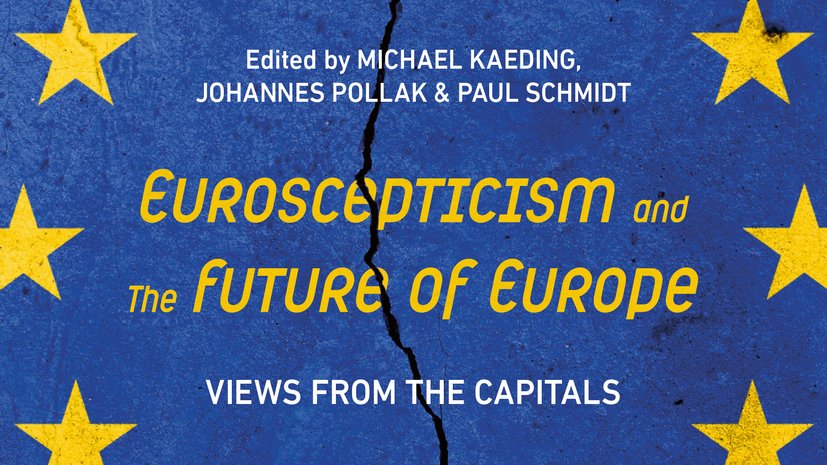
"Euroscepticism and the Future of Europe: Views from the Capitals" is starting now!
#Zoom in now, or join us one Facebook to hear contributions from @MichaelKaeding, @_PaulSchmidt, @davferrari90, and @Poli_Eleonora
As always, we will be highlighting key quote here
/THREAD
#Zoom in now, or join us one Facebook to hear contributions from @MichaelKaeding, @_PaulSchmidt, @davferrari90, and @Poli_Eleonora
As always, we will be highlighting key quote here
/THREAD

Given we have two of the editors with us, we have the fitting introduction from @unidue's @MichaelKaeding:
"The beauty of these books is that they zoom in on national perspectives: 'Views from the Capitals'"
/3
"The beauty of these books is that they zoom in on national perspectives: 'Views from the Capitals'"
/3
"Eurosceptics is nothing new, we have been experiencing it since the very beginning. But it is specifically with the Maastricht Treaty and the various referenda that the modern Euroscepticism began in earnest"
- @MichaelKaeding from @unidue
/4
- @MichaelKaeding from @unidue
/4
"Since we have waves of EU Membership, different national narratives proliferate on Euroscepticism. It is running out of steam in some countries, and running full of steam in others"
- @MichaelKaeding from @unidue
/5
- @MichaelKaeding from @unidue
/5
"Euroscepticism takes many forms: in some countries like Czechia or Lithuania, it is political parties that pick up the trend, whereas in others it is a more grassroots movement. Euroscepticism is a moving target, it is in constant flux"
- @MichaelKaeding from @unidue
/6
- @MichaelKaeding from @unidue
/6
With this, @MichaelKaeding hands back over to our moderator @SabinaKLange after a great framing contribution to the discussion
/7
/7
With this we move to an analysis of how Euroscepticism has manifested itself in the @Europarl_EN, a contribution by @VoteWatchEurope's @davferrari90
/8
/8
"It's not rare to see the pro-European bloc to vote in three different ways"
- @davferrari90 from @VoteWatchEurope
/9
- @davferrari90 from @VoteWatchEurope
/9
"This is because @Europarl_EN discussions do not fall neatly into pro- or anti-EU camps. The approach of #UKIP of the #Brexit Party to avoid all engagement and vote against even the most moderate proposal is not shared by all anti-EU blocs either"
- @davferrari90
/10
- @davferrari90
/10
"At the start of this Parliamentary term, it became clear that there has been a cleavage in the @EPP on key issues in the context of the rise of the nationalist alternative"
- @davferrari90 from @VoteWatchEurope
/11
- @davferrari90 from @VoteWatchEurope
/11
Thanks to @davferrari90 from @VoteWatchEurope for his fascinating analysis of the @Europarl_EN term since 2019 and the role of Eurosceptic parties and groups within it
/12
/12
With this, @SabinaKLange gives the floor to @Poli_Eleonora to analyse #Euroscepticism in Italy, a country making headlines for the pro- and anti-EU cleavage among its public
/13
/13
"At the moment, the majority are voting around the 'national' framework, especially in the wake of #COVID19. Italians tend to prefer local solutions to the crisis, playing into this Eurosceptic sentiment"
- @Poli_Eleonora from @IAIonline
/14
- @Poli_Eleonora from @IAIonline
/14
"#Salvini was unable to lead through this crisis. His rhetoric was focussed on #migration and he downplayed #COVID19. So his key leaders in office were unable to face the crisis, and the effect has hurt his political project"
- @Poli_Eleonora from @IAIonline
/15
- @Poli_Eleonora from @IAIonline
/15
"Salvini had no clear idea of Italy's role inside of the EU, or of the EU's role in Italy"
@Poli_Eleonora from @IAIonline describes how #Salvini's #Euroscepticism was more focussed on opposing than on proposing a viable alternative
/16
@Poli_Eleonora from @IAIonline describes how #Salvini's #Euroscepticism was more focussed on opposing than on proposing a viable alternative
/16
"There is a sense of being European, but that is not reflected into a trust of the EU as a political entity unto itself"
- @Poli_Eleonora wraps up her fascinating contribution on #Euroscepticism in Italy
/17
- @Poli_Eleonora wraps up her fascinating contribution on #Euroscepticism in Italy
/17
In addition to being an editor of the book, @_PaulSchmidt from @oegfe is also the author of the chapter on Euroscepticism in Austria
We now turn to him to make a further contribution to the conversation
/18
We now turn to him to make a further contribution to the conversation
/18
"Austria is not an island where we can cross a border into somewhere where nothing has anything to do with us. We are an open economy, we depend on the #SingleMarket"
- @_PaulSchmidt from @oegfe begins his contribution
/19
- @_PaulSchmidt from @oegfe begins his contribution
/19
"That is why the book is so useful, because you can dip in to learn very quickly and in a lot of detail about Euroscepticism in 40 countries"
- @_PaulSchmidt from @oegfe describes the value of "Euroscepticism and the Future of Europe: Views from the Capitals"
/20
- @_PaulSchmidt from @oegfe describes the value of "Euroscepticism and the Future of Europe: Views from the Capitals"
/20
"In Austria one thing is very clear: there has always been support for membership. It is at 75% and increases with #Brexit
-@_PaulSchmidt from @oegfe
/21
-@_PaulSchmidt from @oegfe
/21
"There is nevertheless opposition to some of the ways policy manifests at the European level. Despite this, Austria has a seat at the table, and has power to change"
- @_PaulSchmidt from @oegfe
/22
- @_PaulSchmidt from @oegfe
/22
"There is a strong tension between Eurosceptics' radical attitude when in opposition and their less radical approach once in government. This is why they have struggled so much"
- @_PaulSchmidt from @oegfe
/23
- @_PaulSchmidt from @oegfe
/23
"We're all in this boat together and if we don't work towards efficient solutions to cross border problems, then it affects us. Therefore national promotion doesn't help anyone"
- @_PaulSchmidt from @oegfe
/24
- @_PaulSchmidt from @oegfe
/24
With this contribution, @SabinaKLange opens the floor to discussion, first by asking @Poli_Eleonora about the differences in Euroscepticism between cities and countryside
/25
/25
"In most countries you can now divide the population in two: those who benefitted from globalisation, those who didn't. The former tend to live in cities, the latter tend not to"
- @Poli_Eleonora from @IAIonline
/26
- @Poli_Eleonora from @IAIonline
/26
"Populist parties are successful because they are direct. Often their answer is wrong, but they provide people with a simple message, and no grey area"
- @Poli_Eleonora from @IAIonline
/27
- @Poli_Eleonora from @IAIonline
/27
"The changes we've observed in that past few months are temporary: in the crisis management period, there were fewer divisions. Now that we are moving forward, we see these divisions reappearing"
- @davferrari90 from @VoteWatchEurope on dynamics in the @Europarl_EN
/28
- @davferrari90 from @VoteWatchEurope on dynamics in the @Europarl_EN
/28
As we turn back to @MichaelKaeding, our moderator @SabinaKLange from @eu_eipa asks the audience to ask questions in the chat - this is YOUR chance to get involved in the conversation around "Euroscepticism and the Future of Europe: Views from the Capitals"
/29
/29
#Euroscepticism is not something we find only in the capitals. We need to think of how to address the different types of Euroscepticism, and the local level is key: we need people on the ground who know what the EU is about and why it is needed
/30
/30
... France, Cyprus, Poland, Finland, all have very different interests. Brussels is very important of course, but it is the street-level implementers that guarantee what impact the EU has on peoples' day-to-day lives"
- @MichaelKaeding
/31
- @MichaelKaeding
/31
QUESTION 1:
Do you think that investing in a greener Europe and in environmental policies could have any impact on the rise of Euroscepticism? And can EU money buy EU love?
/32
Do you think that investing in a greener Europe and in environmental policies could have any impact on the rise of Euroscepticism? And can EU money buy EU love?
/32
QUESTION 2:
Russia and China maintain close relationships with many Eurosceptic parties. How do these relationships and their interaction further enhance Euroscepticism?
/33
Russia and China maintain close relationships with many Eurosceptic parties. How do these relationships and their interaction further enhance Euroscepticism?
/33
A questions too from @NewEuropeans Secretary-General @rogercasale, who joins us by video link, on the topics of Marine Le Pen and Euroscepticism in France, and the role of civil society in increasing participation in EU politics
We're glad you're enjoying the discussion!
/34
We're glad you're enjoying the discussion!
/34
First of all, @MichaelKaeding from @unidue begins the discussion on the role of civil society: "there is a lot of complexity, and this is where civil society has to come in. This is what we try to do with these books"
/35
/35
"There is public support in many European countries for green reform, and Eurosceptic parties struggle with this and try to turn the topic back to their common stable: migration and so on"
- @davferrari90 from @VoteWatchEurope
/36
- @davferrari90 from @VoteWatchEurope
/36
"Italy is one of the most pro-Russian countries in the EU simply because we have not much of a relationship with Russia"
- @Poli_Eleonora from @IAIonline
/37
- @Poli_Eleonora from @IAIonline
/37
"The #EUGreenDeal is very popular in Austria because people understand that this is a cross border issue that can only be solved together. The questions is one of implementation: can we meet our objectives?"
- @_PaulSchmidt from @oegfe
/38
- @_PaulSchmidt from @oegfe
/38
After our panellists @MichaelKaeding, @_PaulSchmidt, @davferrari90, and @Poli_Eleonora have now addressed our audience questions, our moderator @SabinaKLange congratulates our editors and authors for "Euroscepticism and the Future of Europe: Views from the Capitals"
/39
/39
We now close our discussion with thanks to our moderator @SabinaKLange (@eu_eipa) and our contributors:
@MichaelKaeding (@unidue)
@_PaulSchmidt (@oegfe)
@davferrari90 (@VoteWatchEurope)
@Poli_Eleonora (@IAIonline)
/40
@MichaelKaeding (@unidue)
@_PaulSchmidt (@oegfe)
@davferrari90 (@VoteWatchEurope)
@Poli_Eleonora (@IAIonline)
/40
This discussion was on "Euroscepticism and the Future of Europe: Views from the Capitals", the TEPSA book edited by @MichaelKaeding, @_PaulSchmidt, and @JohannesPollak, which covers #Euroscepticism in over 40 countries in the EU and beyond
➡️ tepsa.eu/tepsa-books/
/41
➡️ tepsa.eu/tepsa-books/
/41
With that, thanks to all our guest contributors, to our moderator, and to our audience
More to follow soon!
/ENDS
More to follow soon!
/ENDS
@threadreaderapp please unroll
• • •
Missing some Tweet in this thread? You can try to
force a refresh






